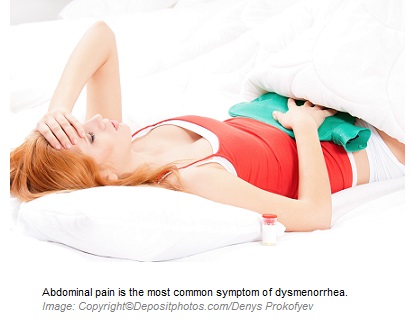Dysmenorrhea is painful menstruation. It is the most common complaint of gynecologic  patients. Most women experience a mild discomfort during menstruation. However, dysmenorrhea is when the pain is severe enough to interfere with patient`s daily activities.
patients. Most women experience a mild discomfort during menstruation. However, dysmenorrhea is when the pain is severe enough to interfere with patient`s daily activities.
Dysmenorrhea occurs in menstrual cycles with ovulation. Since first menstrual cycles are not associated with ovulation, dysmenorrhea is not seen. Pain starts at the first day of menstruation and may continue until the second day. Pain may be associated with nausea, vomiting, constipation, diarrhea, headache and even dizziness.
There are three types of dysmenorrhea: primary, secondary and membranous. Primary dysmenorrhea occurs without any organic causes. Secondary dysmenorrhea is often due to other causes such as endometriosis, ovarian cysts, pelvic inflammatory disease, and tumors. Membranous dysmenorrhea is rare and resulted from passing decidua (endometrial cast; membranous layer lining the uterine).
Nutritional Supports:
Restricted Foods:
- Saturated fats.
- Trans-fats.
- Fried foods.
- Alcohol.
- Caffeine.
- Dairy products.
- Foods high in Omega-6: safflower oil, sunflower oil, sesame oil, grape seed oil, beef, avocado, corn, and egg yolk.
Recommended Foods:
- Drink plenty of water: at least 2 liters a day.
- Whole grains.
- Legumes: lentils and beans.
- Foods high in Omega-3: fish, flaxseed, hemp seed, chia seed, and walnuts.
- Fresh vegetables.
- Flaxseeds.
- Foods high in magnesium: nuts, seeds, and spinach.
- Foods high in flavonoids: berries and red grapes.
- Wild yam.
- Garlic.
- Basil.
- Peppermint.
- Ginger.
- Evening primrose oil.
- Camomile tea.
Recommended Supplements:
- Magnesium: 400 mg a day. This mineral promotes relaxation and may reduce discomfort.
- Omega – 3 Fatty Acids: 2 – 3 grams a day.
- French Maritime Pine Bark Extract: 100 – 200 mg a day. It is a powerful antioxidant that reduces inflammation, improves blood circulation, and may decrease discomfort.
- Vitamin B – Complex: A high potency product.
- Black Cohosh Extract: 160 – 320 mg a day. Black cohosh contains triterpene glycosides (acetin and 27-deoxyacetin) and isoflavones and may help with symptoms of menopause, painful menstruation and painful intercourse. Caution: black cohosh should not be used during pregnancy and breastfeeding.
- Blue Cohosh: 300 – 1000 mg a day, or as tincture 3 – 5 ml a day.
- Dong Quai Extract: 500 – 1500 mg a day. This herb has an adaptogenic effect and may help reduce pain and cramp.
- Vitamin E: 400 – 800 IU a day.
- Vitex (Chasteberry): 180 – 240 mg a day.
- Calcium: 1000 mg a day.
- Grape Seed Extract: 50 – 100 mg a day.
Miscellaneous Suggestions:
- Liver detoxification.
- Colon cleansing.
- Acupuncture.

